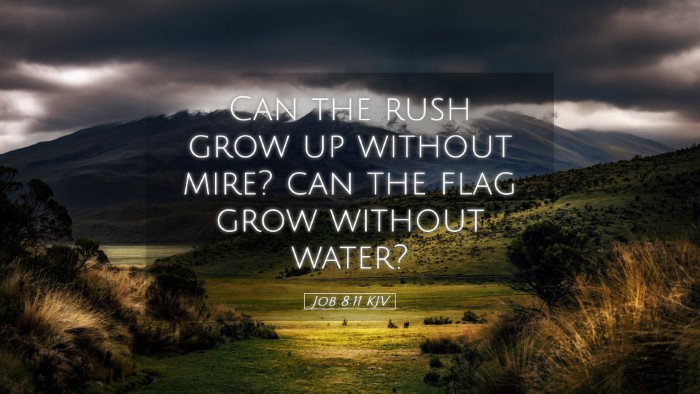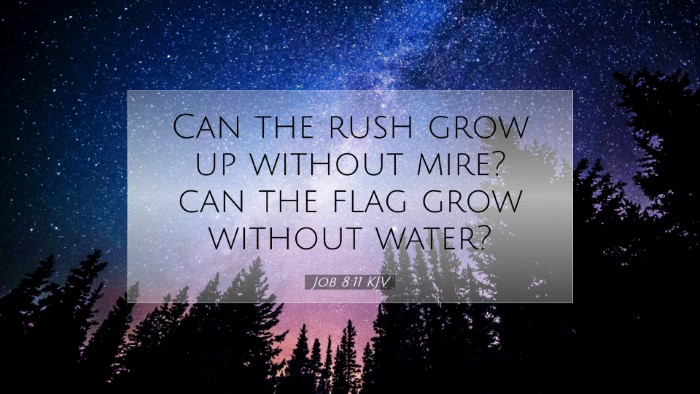Old Testament
Genesis Exodus Leviticus Numbers Deuteronomy Joshua Judges Ruth 1 Samuel 2 Samuel 1 Kings 2 Kings 1 Chronicles 2 Chronicles Ezra Nehemiah Esther Job Psalms Proverbs Ecclesiastes Song of Solomon Isaiah Jeremiah Lamentations Ezekiel Daniel Hosea Joel Amos Obadiah Jonah Micah Nahum Habakkuk Zephaniah Haggai Zechariah MalachiJob 8:11
Job 8:11 KJV
Can the rush grow up without mire? can the flag grow without water?
Job 8:11 Bible Commentary
Commentary on Job 8:11
Verse: "Can the rush grow up without mire? Can the flag grow without water?" (Job 8:11, KJV)
Introduction
The verse Job 8:11 serves as a poignant metaphor illustrating the nature of life and the consequences of one's actions in relation to their foundation. In this commentary, we will explore the various insights from public domain commentaries, focusing on the theological, literary, and practical implications of this verse.
Theological Insights
Matthew Henry's Exposition: Henry emphasizes that just as rushes and flags cannot thrive without proper conditions (mire and water, respectively), so also human prosperity and growth depend on the foundational presence of God's grace and favor. Henry posits that the implication is clear; without a nourishing environment, both natural and spiritual life cannot flourish.
Albert Barnes' Notes: Barnes underscores the necessity of spiritual sustenance, likening it to a plant rooted in a nourishing soil. He interprets the enduring principle that growth in righteousness requires a connection to God’s Word and Spirit—much like a plant requires water and good earth. As such, one’s spiritual condition cannot arise from a barren heart; it must be revitalized by the invigorating presence of divine guidance.
Adam Clarke’s Commentary: Clarke takes a comprehensive approach, suggesting that the 'rush' and 'flag' symbolize the transient aspects of life. He notes that if one desires a life marked by strength and stability, it must be rooted in the substance of divine influence. Thus, he correlates true resilience not just to external circumstances but to an internal relationship with God.
Literary Analysis
This verse utilizes the natural imagery of vegetation to draw a spiritual lesson. The rush and flag represent the idea that simply existing in a dry, barren environment will lead to stagnation and decay. This literary device is crucial for developing a deeper understanding of the conditions necessary for spiritual growth.
- Imagery of Dependency: The rush's dependency on mire and the flag's reliance on water symbolize the inextricable link between our spiritual growth and our environment. This connection challenges readers to consider the 'mire' and 'water' in their own lives, prompting reflection on their influences and sources of spiritual nourishment.
- Contrast of Life Stages: The flourishing of these plants in their natural environment creates an implicit contrast with the lives of those who are spiritually dry. The flourishing field is juxtaposed with barren soil to awaken a recognition of the consequences of spiritual neglect.
Practical Implications
This scripture encourages pastors, students, and theologians to dig deeper into their own spiritual foundations. The symbolic significance implies that just as plants require the right conditions to grow, so do believers. This calls for an examination of one’s spiritual environment, and the need to cultivate connections to sources of spiritual vitality.
Application in Pastoral Ministry: Pastors can use this verse to encourage congregations to seek environments where faith can thrive. This includes intentional community worship, engaging in scriptural studies, and cultivating prayer life that mirrors the sustenance required for growth.
Learning for Theology Students: For theology students, Job 8:11 serves as a reminder of the necessity of grounding their understanding of faith in the lived experience of seeking God. The metaphor challenges them to cultivate their own connection with God’s Word as essential for their spiritual education.
Conclusion
Job 8:11 artfully illustrates the universal truth of spiritual dependency, emphasizing that just as rush and flag require specific conditions for growth, so do we need the life-giving waters of God’s presence in our lives. Each commentary offers a unique perspective, contributing to a deeper understanding of this profound truth. As such, this verse prompts each individual to reflect on their spiritual nourishment and the environments they are cultivating both in themselves and their communities.


